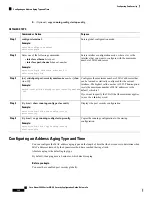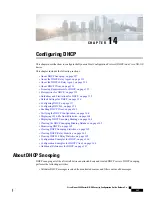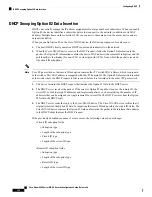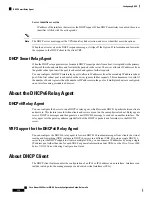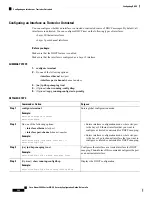
Figure 11: Suboption Packet Formats
VRF Support for the DHCP Relay Agent
You can configure the DHCP relay agent to forward DHCP broadcast messages from clients in a virtual
routing and forwarding (VRF) instance to DHCP servers in a different VRF. By using a single DHCP server
to provide DHCP support to clients in multiple VRFs, you can conserve IP addresses by using a single IP
address pool rather than one for each VRF. For general information about VRFs, see the
Cisco Nexus 9000
Series NX-OS Unicast Routing Configuration Guide
.
Enabling VRF support for the DHCP relay agent requires that you enable Option 82 for the DHCP relay agent.
If a DHCP request arrives on an interface that you have configured with a DHCP relay address and VRF
information and the address of the DCHP server belongs to a network on an interface that is a member of a
different VRF, the device inserts Option 82 information in the request and forwards it to the DHCP server in
the server VRF. The Option 82 information includes the following:
VPN identifier
Name of the VRF that the interface that receives the DHCP request is a member of.
Link selection
Subnet address of the interface that receives the DHCP request. When DHCP smart relay is enabled, the
link selection is filled with the subnet of the active giaddr.
Cisco Nexus 9000 Series NX-OS Security Configuration Guide, Release 9.x
333
Configuring DHCP
VRF Support for the DHCP Relay Agent


